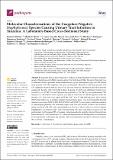Molecular characterizations of the coagulase-negative staphylococci species causing urinary tract infection in Tanzania : a laboratory-based cross-sectional study
Abstract
Background: There is a growing body of evidence on the potential involvement of coagulase-negative Staphylococci (CoNS) in causing urinary tract infections (UTIs). The aim of this study was to delineate virulence potential, antimicrobial resistance genes, and sequence types of CoNS isolated from patients with UTI symptoms and pyuria in Tanzania. Methods: CoNS from patients with UTI symptoms and more than 125 leucocytes/μL were retrieved, subcultured, and whole-genome sequenced. Results: Out of 65 CoNS isolates, 8 species of CoNS were identified; Staphylococcus haemolyticus, n = 27 (41.5%), and Staphylococcus epidermidis, n = 24 (36.9%), were predominant. The majority of S. haemolyticus were sequence type (ST) 30, with 8 new ST138-145 reported, while the majority of S. epidermidis were typed as ST490 with 7 new ST1184-1190 reported. Sixty isolates (92.3%) had either one or multiple antimicrobial resistance genes. The most frequently detected resistance genes were 53 (21%) dfrG, 32 (12.9%) blaZ, and 26 (10.5%) mecA genes conferring resistance to trimethoprim, penicillin, and methicillin, respectively. Out of 65 isolates, 59 (90.8%) had virulence genes associated with UTI, with a predominance of the icaC 47 (46.5%) and icaA 14 (13.9%) genes. Conclusion: S. haemolyticus and S. epidermidis harboring icaC, dfrG, blaZ, and mecA genes were the predominant CoNS causing UTI in Tanzania. Laboratories should carefully interpret the significant bacteriuria due to CoNS in relation to UTI symptoms and pyuria before labeling them as contaminants. Follow-up studies to document the outcome of the treated patients is needed to add more evidence that CoNS are UTI pathogens.
Citation
Phillip , S , Mushi , M F , Decano , A G , Seni , J , Mmbaga , B T , Kumburu , H , Konje , E T , Mwanga , J R , Kidenya , B R , Msemwa , B , Gillespie , S , Maldonado-Barragan , A , Sandeman , A , Sabiti , W , Holden , M T G & Mshana , S E 2023 , ' Molecular characterizations of the coagulase-negative staphylococci species causing urinary tract infection in Tanzania : a laboratory-based cross-sectional study ' , Pathogens , vol. 12 , no. 2 , 180 . https://doi.org/10.3390/pathogens12020180
Publication
Pathogens
Status
Peer reviewed
ISSN
2076-0817Type
Journal article
Description
Funding: This study is part of the Holistic Approach to Unravel Antibacterial Resistance in East Africa (HATUA) project funded by the National Institute for Health Research, Medical Research Council and the Department of Health and Social Care, Award (MR/S004785/1).Collections
Items in the St Andrews Research Repository are protected by copyright, with all rights reserved, unless otherwise indicated.

